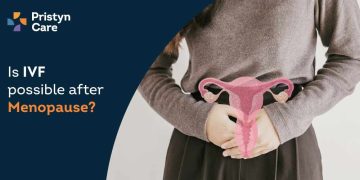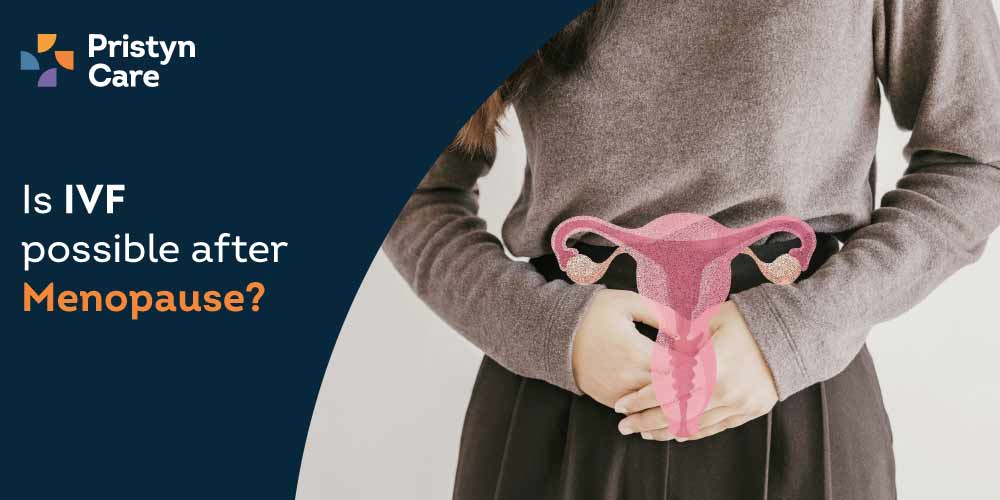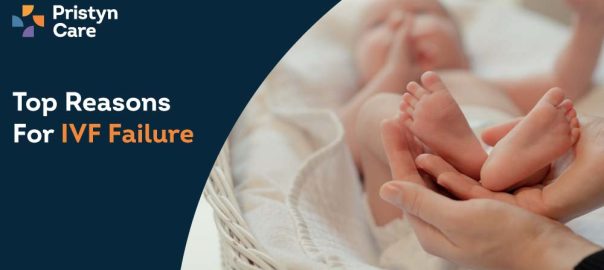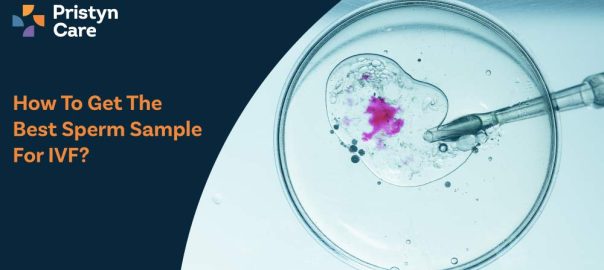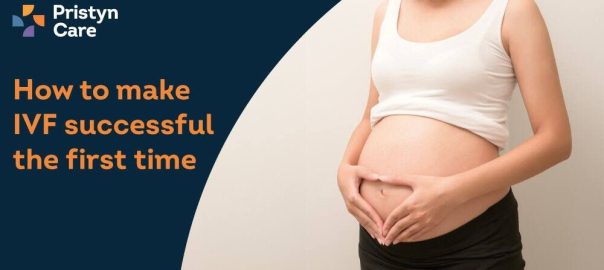![]() Views: 198
Views: 198
Is IVF possible after menopause?
IVF has become an increasingly popular choice for those battling diverse fertility problems such as blocked fallopian tubes, endometriosis, and diminished ovarian reserve.
Dedicated Support at Every Step!
Our Doctors are available 24 hours a day, 7 days a week to help you!
Call Us0806-541-7961Table of Contents
Introduction
Moreover, recent advancements in IVF techniques have opened up new motherhood possibilities for women beyond menopause. This article aims to help you understand these complex medical processes in simple terms. It also highlights their relationship and what they potentially mean for women's fertility.
No Cost EMI, Hassle-free Insurance Approval
Menopause and Its Impact on Fertility
Menopause is a natural biological process signifying the cessation of a woman's reproductive years, usually between the ages of 45 and 55. The ovaries stop producing eggs during this time, significantly dropping hormone levels, particularly estrogen and progesterone. Consequently, the likelihood of natural conception dwindles significantly, profoundly affecting fertility. However, assisted reproductive technologies like IVF offer women the chance to pursue motherhood even after menopause.
Understanding Menopause
Menopause is defined as a stage when a woman has not had her menstrual period for 12 consecutive months. Menopause is a natural part of aging that happens when a woman's ovaries stop producing estrogen and progesterone, resulting in the end of her menstrual periods and reproductive years. The journey towards menopause can be divided into four stages:
- Pre-Menopause: This stage covers a woman's reproductive years, during which she experiences regular menstrual cycles without significant menopausal symptoms.
- Perimenopause: Usually starting in a woman's 40s, this transitional phase lasts for several years and is characterised by irregular menstrual cycles. Symptoms include hot flashes, mood swings, and decreased libido. Though fertility declines at this stage, pregnancy remains possible.
- Menopause: This stage is achieved when a woman has not menstruated for 12 months. The ovaries stop functioning at this point, making natural conception impossible.
- Post-Menopause: Post-menopause follows after the menopause stage and lasts for the rest of a woman's life. While many menopausal symptoms may decrease, health risks such as osteoporosis and heart disease increase due to lower estrogen levels.
Effects of Menopause on The Body
Menopause significantly affects reproductive health, mainly due to the cessation of ovarian function and hormonal changes. Key effects include:
- Decline in Fertility: As women approach menopause, their fertility decreases dramatically. Pregnancy can still occur during perimenopause but becomes highly unlikely once menopause is reached.
- Physical Symptoms: Common symptoms associated with menopause include hot flashes, night sweats, vaginal dryness, and mood swings. These changes can impact a woman's quality of life and emotional well-being.
- Long-term Health Risks: Postmenopausal women face increased risks of various health conditions, including osteoporosis, cardiovascular disease, and urinary incontinence. The decrease in estrogen levels contributes to bone density loss and can also affect heart health.
Understanding these stages and effects is vital to guide a woman's healthcare decisions and lifestyle choices during and after menopause.
IVF and Menupause
IVF presents unique challenges for women experiencing menopause or perimenopause. As natural fertility declines with age and hormonal changes, IVF can offer a viable option for those seeking to conceive. Understanding how menopause affects IVF success and the strategies to enhance outcomes can help navigate this complex journey.
How IVF Typically Works?
The IVF process comprises several key steps designed to maximise the chances of successful conception:
- Consultation and Evaluation: A thorough medical assessment evaluates the woman's overall health and fertility status, including hormone levels and uterine health.
- Ovarian Stimulation: Hormonal medications are administered to stimulate the ovaries, promoting the development of multiple eggs.
- Egg Retrieval: Once the eggs mature, a minor surgical procedure is performed to retrieve them from the ovaries using ultrasound guidance.
- Fertilisation: The retrieved eggs are fertilised with sperm in a laboratory setting. This can involve using the partner's sperm or donor sperm.
- Embryo Culture: The fertilised eggs, now embryos, are cultured for several days to allow for development.
- Embryo Transfer: After a few days of cultivation, one or more healthy embryos are selected and transferred into the woman’s uterus, where implantation may occur.
- Pregnancy Test: Approximately two weeks after the embryo transfer, a pregnancy test is conducted to determine if implantation was successful.
Challenges of IVF in Post-Menopausal Women
While IVF offers hope for women wishing to conceive after menopause, several challenges must be addressed:
- Ovarian Function: Post-menopausal women do not produce viable eggs due to the cessation of ovarian activity. Therefore, IVF typically relies on donor eggs, introducing additional considerations regarding donor selection and health.
- Uterine Preparation: Hormone Replacement Therapy (HRT) is often necessary to prepare the uterine lining for embryo implantation. This process can be complex as the hormonal environment must be carefully managed to create a suitable environment for pregnancy.
- Success Rates: The success rates of IVF in post-menopausal women can be lower compared to younger women. Factors such as the age and health of the egg donor, as well as the overall health of the recipient, play critical roles in determining the likelihood of a successful pregnancy.
- Health Risks: Older women may face higher risks of pregnancy-related complications, such as gestational diabetes and hypertension. Thorough medical evaluations and monitoring are vital to mitigate these risks.
- Emotional and Psychological Factors: The journey of pursuing IVF after menopause can be emotionally challenging. Women may experience feelings of loss regarding their natural fertility and face societal pressures regarding motherhood. Support systems and counselling can be beneficial in navigating these emotional hurdles.
While IVF presents a viable option for post-menopausal women to pursue motherhood, it requires careful consideration of medical, emotional, and logistical factors to optimise the chances of success.
Fertility Options for Post-Menopausal Women
As women age, the chances of natural conception decrease due to a reduction in the number of viable eggs. However, advances in fertility treatments offer several options for post-menopausal women who wish to conceive. Let's explore the options below:
Using Donor Eggs
Using donor eggs provides an opportunity for women with diminished ovarian reserve or other fertility challenges to achieve pregnancy. This approach involves retrieving eggs from a donor and fertilising them with the partner’s sperm or donor sperm.
- How Donor Eggs are Used in IVF?
In the context of IVF for post-menopausal women, donor eggs play a critical role. It is often necessary to use donor eggs because the woman's eggs may no longer be viable due to age. The process involves the selection of a younger, fertile woman who agrees to donate eggs. This donor undergoes a process known as ovarian stimulation to produce multiple eggs. These eggs are then retrieved and fertilised with sperm from the recipient's partner or a sperm donor in a lab. - Success Rates and Considerations
The success rates vary but can be notably high when using donor eggs, with some clinics reporting rates as high as 75%. Factors influencing success can include the age and health of the egg donor, as well as the quality of the embryos. It is important to consider potential complications such as gestational diabetes and pregnancy-related hypertension, which can be more prevalent among older mothers.
Ovarian Tissue Transplantation
Ovarian tissue transplantation involves freezing and later re-implanting ovarian tissue to restore fertility and hormonal function. This technique offers a chance for conception after treatments that impact ovarian function.
- What is Ovarian Tissue Transplantation?
This method involves the surgical removal of ovarian tissue from a woman, which is then frozen and transplanted back into her body at a later date. The goal of this procedure is to restore ovarian function and potentially enable natural conception or improve the effectiveness of IVF by providing viable eggs. - Success Rates and Potential Risks
The success rates associated with ovarian tissue transplantation vary significantly. Some women may regain ovarian function and achieve pregnancy; however, the procedure is complex and not always successful. Risks include complications from surgery, the potential for ovarian hyperstimulation, and the risk of reintroducing any underlying health conditions associated with infertility.
Hormone Replacement Therapy (HRT)
HRT helps manage menopause symptoms and restore hormonal balance. It can support fertility treatments and overall well-being during menopause.
- Role of HRT in Preparing the Uterus for IVF
HRT is a critical component in preparing the uterus of post-menopausal women for IVF. It involves administering hormones that mimic those necessary for embryo implantation. This treatment helps to thicken the uterine lining, making it more receptive to the transferred embryos. - Risks and Benefits of HRT
While HRT can significantly enhance the chances of successful implantation and pregnancy, it does come with risks. These can include an increased chance of developing blood clots, stroke, and certain types of cancer.
Ovarian Stimulation
Ovarian stimulation involves using medications to encourage the ovaries to produce multiple eggs for IVF or other fertility treatments. This process aims to increase the chances of successful conception.
- Feasibility and Methods for Stimulating Ovaries in Post-Menopausal Women
In post-menopausal women, ovarian stimulation is generally not feasible due to the lack of viable eggs. However, in some cases when premature ovarian insufficiency is present, fertility specialists may attempt to stimulate the ovaries using hormonal medications.
- Success Rates and Expectations
The success rates for ovarian stimulation in post-menopausal women are typically low. However, success rates can be significantly higher when donor eggs are used. It's important for women considering IVF after menopause to maintain realistic expectations and to have thorough discussions with their fertility specialists to understand the best options available to them.
Statistics on IVF Success for Women After Menopause
IVF has emerged as a beacon of hope for countless women aiming to conceive after menopause. However, the success rates in these cases exhibit a significant variation, hinging on several crucial factors. If younger women donate eggs for the procedure, the average success rate can reach 52%, with some clinics claiming up to 75% success.
Factors Influencing Success Rates
Several pivotal factors play a role in determining how successful an IVF attempt might be:
- Egg Quality: The quality of eggs donated by younger women becomes vital as egg quality deteriorates with age.
- Recipient's Health: The overall recipient's health, including cardiovascular health and risk of pregnancy complications, also significantly impacts success rates.
- Clinic Expertise: The fertility clinic conducting the IVF procedure needs to have ample experience and expertise.
MBBS, MS-Obs & Gynae | Chief Consultant – IVF & Fertility Sciences
₹2400₹1200Consultation Fee
MBBS, MS-Obs&Gynae, Fellowship N.B. (Reproductive Medicine)
₹2400₹1200Consultation Fee
MBBS, MS - Obstetrics & Gynaecology, DNB, MRCOG (Part 1) FIRM
₹1000₹500Consultation Fee
Ethical and Psychological Considerations
Fertility treatments raise ethical issues like embryo management and donor anonymity, while also impacting emotional well-being. Addressing these concerns is crucial for supporting individuals and couples through the process.
Ethical Questions Surrounding IVF After Menopause
A series of ethical questions arise when exploring the concept of IVF post-menopause:
- Appropriate Age Limits: There's an ongoing debate about whether there should be an age limit for IVF due to higher health risks for older mothers.
- Child's Welfare: Ethical concerns arise when older parents may not live to see their child grow up.
- Allocation of Limited Resources: Given IVF's high cost, questions arise about who should be granted access to these finite fertility treatment resources.
Psychological Impact on Women and Their Families
Opting for IVF after menopause also carries a psychological impact:
- Grief Over Lost Fertility: Women often undergo a period of grief and loss when their natural fertility comes to an end.
- Social Pressure: Certain cultures place immense pressure on women to bear children, which can intensify during menopause.
- Stress of the IVF Process: The physical and emotional demands of IVF can be quite taxing, especially for older women.
The choice to undergo IVF after menopause is an intensely personal one. It requires careful consideration of various medical, ethical, and psychological factors. Here, consultation with fertility specialists and maintaining solid support systems can greatly aid women in navigating this complex journey.
Costs and Accessibility
The financial aspect of undergoing IVF after menopause in India can be significantly more accessible compared to many Western countries. The cost of IVF with donor eggs typically ranges from ₹ 3,00,000 to ₹ 4,50,000 for a single cycle. This includes various components such as:
- Base IVF Fee: This covers monitoring, egg retrieval, and embryo transfer. The average base fee for a standard cycle ranges from ₹ 90,000 to ₹ 1,50,000.
- Donor Egg Costs: These can add ₹ 1,80,000 to ₹ 2,00,000 to the total cost, depending on the clinic and the donor's profile.
- Medications: Hormonal medications for ovarian stimulation can range from ₹ 20,000 to ₹ 40,000.
- Diagnostic Tests: Pre-treatment assessments can add ₹ 5,000 to ₹ 10,000 to the overall fees.
- Additional Procedures: Costs increase with procedures like genetic testing or ICSI (Intracytoplasmic Sperm Injection).
India's healthcare system offers financial options including medical tourism packages that bundle treatment costs with travel and accommodation. This often results in savings of 30-40%. Some clinics provide zero-cost EMI options to make payments more manageable.
Financial Aspects of Undergoing IVF After Menopause
The affordability and accessibility of IVF after menopause in India make it an attractive option for many couples. However, it is vital for couples considering this option to understand all the financial aspects associated with it.
From the cost of the treatment itself to additional procedures, such as genetic testing or ICSI, couples need to consider various expenses. Costs related to donor eggs must also be factored in. Couples need to account for all these expenses while planning their financial resources.
Availability of Treatments and Donor Services
The availability of donor services in India considerably adds to the feasibility of undergoing IVF treatment. Numerous clinics provide these services, making it convenient for couples residing in different parts of India. This availability with the competitive costs and high-quality medical care, makes India a favourable location for IVF treatments.
Alternative Routes to Parenthood
Beyond IVF, there are additional routes to parenthood available for post-menopausal women in India:
- Adoption: A viable option for many couples now comes with various agencies and legal frameworks in place to facilitate the process.
- Surrogacy: Here, a surrogate carries the pregnancy for the intended parents. Given India’s legal provisions governing surrogacy arrangements, it has become a popular choice.
- Foster Care: Providing a home for children in need can also be a fulfilling route to parenthood.
Conclusion
Undergoing IVF after menopause in India offers an accessible financial landscape, substantially more affordable than many Western countries. With numerous routes to parenthood available, including donor services, women looking to conceive later in life have a host of choices. Alternative options, such as adoption or surrogacy, also provide additional avenues to explore.
As reproductive technologies continue to advance, India remains an attractive destination for those considering IVF. It is however vital for women to evaluate their options carefully. Consult with fertility specialists and consider their financial circumstances before making informed decisions on their journey to parenthood.
References
- https://www.indiaivf.in/blog/can-ivf-be-done-after-menopause/
- https://www.ncbi.nlm.nih.gov/pmc/articles/PMC2788687/
- https://www.msdmanuals.com/en-in/home/women-s-health-issues/biology-of-the-female-reproductive-system/effects-of-aging-on-the-female-reproductive-system
- https://www.who.int/news-room/fact-sheets/detail/menopause
- https://www.nia.nih.gov/news/research-explores-impact-menopause-womens-health-and-aging
- https://www.worldivfcentre.com/blog-details/ivf-after-menopause
- https://www.medicalnewstoday.com/articles/320228



